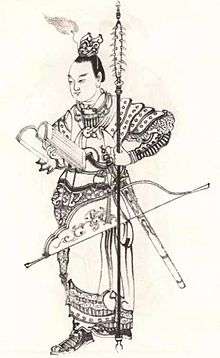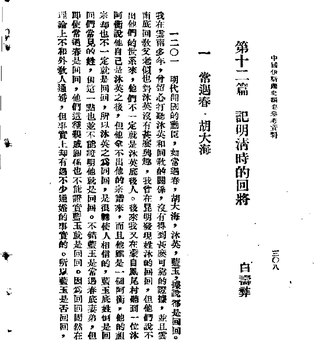Mu Ying
| Mu Ying | |
|---|---|
| 沐英 | |
 | |
| Marquis of Xiping (西平侯) | |
|
In office 1377–1392 | |
| Succeeded by | Mu Chun |
| Personal details | |
| Born |
1345 Dingyuan County, Hao Prefecture, Henan (mordern Dingyuan County, Chuzhou, Anhui) |
| Died |
1392 (aged 47) Yunnan Fu, Yunnan (mordern Kunming, Yunnan) |
| Children |
|
| Parents |
Mu Chao (father) Hongwu Emperor (adoptive father) |
| Courtesy name | Wenying (文英) |
| Posthumous name | Zhaojing (昭靖) |
Mu Ying (1345-1392) was a general during the Ming Dynasty, and an adopted son of its founder, the Hongwu Emperor (aka Zhu Yuanzhang). Mu Ying was one of the few capable generals who survived the massacre of Hongwu.
When the Ming dynasty emerged Emperor Zhu Yuanzhang's military officers who served under him were given noble titles which privileged the holder with a stipend but in all other aspects was merely symbolic.[1] Mu Ying's family was among them.[2][3][4][5][6][7] Special rules against abuse of power were implemented on the nobles.[8] Yunnan remained in his family.[9]
Mu and his descendants guarded Yunnan, a province near Burma and Vietnam, until the end of the Ming dynasty. As late as the 1650s, his descendant Mu Tianbao was one of the main supporters of the Yongli Emperor, the last emperor of the Southern Ming, and accompanied the fugitive emperor all the way into Burma.[10]
Ethnicity

In his The References of History of Islam in China, Bai Shouyi wrote
明代開國的勳臣,如常遇春,胡大海,沐英,藍玉,據說都是回回。我在雲南多年,會留心打聽沐英和回教的關係,沒有得到甚麼可靠的證據,並且雲南底(的)回教父老似乎也對沐英沒有甚麼興趣,我曾在昆明發現姓沐的回回,但他們說不出自己的世系來,他們不一定就是沐英底(的)後人。後來我又在蒙自鳳尾村聽到一位沐阿衡(阿訇)說自己就是沐英之後,但他拿不出他的宗譜來,而且他雖是一個阿衡(阿訇),他的祖宗不一定就是回回,所以沐英之為回回,是很難使人相信的……
Bai explained that he failed to find any reliable proof of Mu Ying was a Hui Chinese. Thus, "it sounded unconvincing" to "identify him as one of Hui people". However, later, the biography of Mu was included in A History of the Chines Hui People (中国回回民族史), which was edited by Bai without further evidences.[11]
Michael Dillon wrote "There is no suggestion in most western accounts of Mu Ying's career or the Chinese sources on which they draw that Mu Ying was anything other than a Han Chinese by origin, yet he has been included in the major series of studies of the lives of eminent Hui as a Muslim without any comment. The surname Mu is also common among Chinese Muslims and is probably derived from Muhammad, although it is normally written with a different Chinese character. The character used to write Mu Ying's surname is the one associated with washing the hair and which appears on signs in every mosque in China as the first character of muyu the ritual baths to be used before prayer." He concludes that "He was probably descended from an old Muslim family but there is no evidence that he was a practising Muslim."[12]
Jonathan Neaman Lipman notes that Mu Ying is among a number of generals "unambiguously claimed as Muslim by Sino-Muslim scholars" mentioning specifically Bai Shouyi. He writes that "There is considerable doubt among non-Muslim scholars as to the “Muslim” identity of most of these generals, but Sino-Muslims assert their “Huiness” unequivocally. Tazaka, Chugoku ni okeru kaikyo, 861, for example, questions not only Chang Yuqun’s identification as a Huihui but that of many others as well. F. Mote, in Goodrich and Fang, Dictionary, 1079–83, indicates that we have no evidence that Mu Ying was born a Muslim, and the story of his adoption and upbringing in Zhu Yuanzhang’s intimate circle certainly indicates that he was not raised as one."[13]
Popular culture
The descendants of Mu Ying are featured in Louis Cha's Wuxia novel The Deer and the Cauldron, set in the early Qing Dynasty. The Mu Prince Residence based in Yunnan is a pro-Ming secret organisation that houses the descendants of Mu Ying and his followers.[14] Mu Jianping of the seven wives of Wei Xiaobao (the protagonist), and her brother Mu Jiansheng, are direct descendants of Mu Ying.[14]
References
- ↑ FREDERIC WAKEMAN JR. (1985). The Great Enterprise: The Manchu Reconstruction of Imperial Order in Seventeenth-century China. University of California Press. pp. 343–344. ISBN 978-0-520-04804-1.
- ↑ http://www.gutenberg-e.org/yang/chapter3.html
- ↑ http://www.gutenberg-e.org/yang/chapter4.html
- ↑ http://www.gutenberg-e.org/yang/chapter5.html
- ↑ http://www.dailymail.co.uk/sciencetech/article-3082435/Gold-filled-tomb-Chinese-superwoman-uncovered-Ming-Dynasty-epitaphs-reveal-remarkable-life-Lady-Mai.html
- ↑ http://www.livescience.com/50820-ming-dynasty-tomb-treasures-photos.html
- ↑ http://www.newhistorian.com/ming-dynasty-tomb-tells-a-remarkable-lifes-story/3770/
- ↑ Frederick W. Mote; Denis Twitchett (26 February 1988). The Cambridge History of China: Volume 7, The Ming Dynasty, 1368-1644. Cambridge University Press. pp. 133–134. ISBN 978-0-521-24332-2.
- ↑ Nicholas Belfield Dennys (1888). The China Review, Or, Notes and Queries on the Far East. "China Mail" Office. pp. 233–.
- ↑ Struve, Lynn A. (translator and editor) (1993), Voices from the Ming-Qing Cataclysm: China in Tigers' Jaws, Yale University Press, pp. 242, 247, ISBN 0-300-07553-7
- ↑ Bai, Shouyi (2007). A History of the Chines Hui People (中国回回民族史). Zhonghua Book Company. pp. 858–861. ISBN 9787101059090.
- ↑ Dillon, Michael (1999). "Lan+Yu"+muslim&ots=83U2TTyWHT&sig=OSvIXRymUl6_q6CZdof4szxO_vQ#v=onepage&q=%22Mu%20Ying%22%20&f=false China's Muslim Hui Community: Migration, Settlement and Sects. Routledge. p. 33. ISBN 978-0700710263.
- ↑ Lipman, Jonathan Neaman (2000). "Ding+Dexing"+muslim&hl=en&sa=X&ei=UWzLU-j0Bsve7AbR_IDQCw&ved=0CCgQ6AEwAQ#v=onepage&q=%22Mu%20Ying%22&f=false Familiar strangers: a history of Muslims in Northwest China. University of Washington Press. p. 22. ISBN 978-0295976440.
- 1 2 Cha, Louis. The Deer and the Cauldron (鹿鼎記). Ming Pao, 1969.
External links
Mu Ying House of Duke of Qian | ||
| Preceded by title created |
Marquis of Xiping (西平侯) 1377 – 1392 |
Succeeded by Mu Chun |